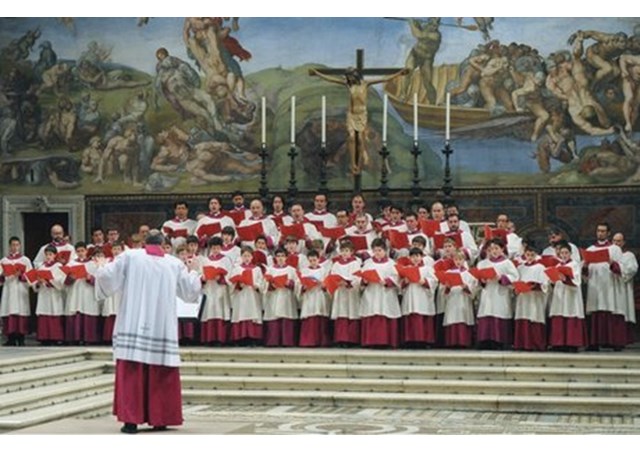
Sistine Chapel's English singer on choir's vision and ecumenical vocation

(Vatican Radio) The celebrations marking Holy Week and Easter comprise one of the busiest periods here in the Vatican, with hundreds of thousands of people flocking to Rome to take part in the liturgies, led by Pope Francis, recalling Christ’s Passion, Crucifixion and Resurrection.
On Sunday morning the Pope’s Easter Mass in St Peter’s Square, followed by his ‘Urbi et Orbi’ blessing to the Church and to the world, is broadcast live on TV and radio stations in countries right across the globe.
An important part of all those celebrations is the music performed principally by the Sistine Chapel Choir in both St Peter’s and at the Colosseum where the Pope leads the traditional Via Crucis or Way of the Cross.
Among the voices you can hear during the celebrations this year is that of a young English baritone, Mark Spyropoulos, the first Englishman since the Reformation to be hired as a full time singer with the Sistine Chapel Choir. He talked to Philippa Hitchen about his work, about the choir’s vision and about its ecumenical vocation….
Mark explains how he arrived in the Vatican by a “very fortuitous accident” as he came to Italy to investigate working with the opera houses but then contacted Maestro Palombella, the director of the Sistine Chapel Choir….
Having always had a passion for singing, Mark talks about the difficulties of finding work in this field. For a time he earned a living by presenting flower bouquets at London’s Royal Opera House, but “as ridiculous as that job might sound”, he says, “it was a great education” as he saw world class artists from opera and ballet performing every night.
The ‘Sistina’ is the oldest choir in the world, Mark notes, going back to about the 6th century and it is the Pope’s Chapel choir, following him wherever he goes. Last September it produced a first CD – the first ever recording in the Sistine Chapel – with music including works by Palestrina, Orlande de Lassus and the Allegri Miserere.
Mark says the music has “great power and is very important as a piece of Western art”, adding that he is very passionate that children should get the chance to sing this kind of music…
Speaking of Maestro Palombella’s “transformation” of the choir, Mark notes how he is very interested in the Anglican choral tradition and wanted to see what the Vatican choir could learn from it. He says it is “a fascinating and very useful tool for ecumenical relations”, adding that when two choirs sing together they use the language of practical ecumenism at work.
| All the contents on this site are copyrighted ©. |


